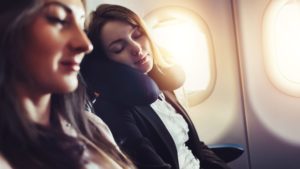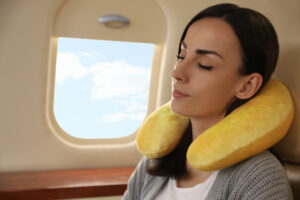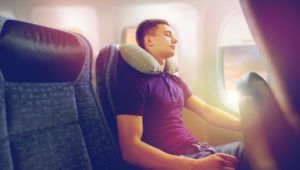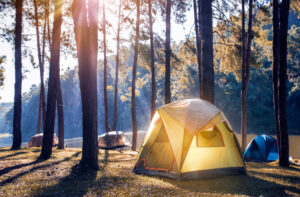Tips for Safely Sleeping in a Car
Getting enough good quality sleep is challenging when taking a long road trip, car camping, or sleeping in a car overnight. Using a vehicle as a temporary dwelling to save money while traveling or experiencing homelessness may cause worry about safety or where to legally park overnight, leading to loss of sleep. Improving sleep health and learning about where to legally park overnight may help people feel safer in the car.
Create a Comfortable Environment
Sleeping in a car overnight under bright lights, surrounded by noise, and in an upright position can feel unsafe, leading to sleep loss. Creating a relaxing environment inside the car may help you get healthy sleep, fall asleep faster, and improve sleep quality.
Limit the Light
Light from street lamps or security flood lights can be useful for safety purposes, but can make it difficult to stay asleep. Reducing the amount of light entering the car from the street may help you stay asleep while maintaining a healthy sleep cycle. Some people use eye masks or put up window coverings inside the car to limit light exposure, keeping it dark during the night to promote better sleep.
Is Your Troubled Sleep a Health Risk?
A variety of issues can cause problems sleeping. Answer three questions to understand if it’s a concern you should worry about.
Decrease the Noise
The amount of noise exposure at night can impact sleep quality. Noises coming from outside the car like traffic or people can cause distraction and prevent sleep onset. Using earplugs, a white noise machine, or playing soft music may help mask intrusive sounds to create a quieter sleeping environment, leading to better sleep.
Recline the Seat
People are more likely to experience a lighter sleep when sleeping in reclining chairs compared to resting horizontally. Sleeping too much in an upright position angle may cause some people to wake up more often throughout the night.
Reclining the car seat back may help people who are sleeping in their car get a good night’s sleep by keeping the head and neck comfortable. Sleeping as close to horizontal as possible may help keep the head and neck in a comfortable position while promoting quality sleep.
Use a Pillow
A neck or travel pillow can help provide comfort when sleeping in a car since it often requires resting in an upright position, leading to an unsupported head and neck during the night. A pillow can help promote better sleep quality by providing extra support for the head and neck in the car seat as the body relaxes during the night.
Sleep on a Mattress
Sleeping on a comfortable mattress may help promote sleep health. Adding a truck mattress, thick blankets, or recreational vehicle (RV) mattress to soften the seat may improve comfort and help promote better rest. During the warmer months, lightweight, breathable materials may provide a cooler feel for hot sleepers while using heavier, thicker fabrics in the winter may help preserve heat during the night.
Keep the Car Cool
People tend to sleep better in cooler temperatures because the body’s core temperature lowers during the night. Some people prefer to use heavier blankets to keep warm in a colder nighttime environment. To help keep the air flowing and promote cooler temperatures, some people open the window of the car or keep the sunroof open during the night.

Practice Relaxation Techniques
When experiencing stress about the safety of sleeping in a car, the worry about trying to fall asleep at night can prevent you from sleeping. Despite being tired, the stressful thoughts may keep you awake and impact your ability to get good quality sleep. The following sleep hygiene tips can help your body relax when preparing to sleep in a car:
- Read a book
- Listen to music
- Meditate
- Breathe deeply
- Drink a warm non-caffeinated beverage
Making sleep a priority and keeping the same sleep schedule every night may help you relax while sleeping in your vehicle. The consistent routine provides a sense of safety to help you wind down at night, signaling the body to fall asleep faster.
Is It Illegal to Sleep in Your Car?
Although there is no federal law against sleeping in a vehicle, staying in your car overnight is illegal in some states and cities. Laws about sleeping legally in your car vary across states, counties, and cities. The National Homelessness Law Center reports that nearly 60% of the U.S. cities surveyed have at least one law prohibiting people from sleeping in cars.
The laws to prohibit people sleeping in vehicles include outright bans on staying in your car anywhere at all, restrictions on overnight parking, or requirements for permitted parking spaces. But some cities allow people to sleep in their car when parked in designated areas such as rest stops, welcome centers, or state parks.
Look up the laws and ordinances specific to the state or city you plan on staying in to ensure it is legal to park overnight. To avoid paying fines or getting towed, be sure to obey any parking signs and be familiar with the local overnight parking regulations in the area.
Safe Places to Sleep in Your Car
Depending on the location and intended length of your stay, you can choose from several safe parking options when sleeping in a car. Rest stops, parks, or parking programs with designated lots may serve as safe places to park overnight.
For people who feel safer in large groups, online websites and mobile apps can connect them with others who car camp together in legal parking areas.
Rest Stops and Welcome Centers
Rest stops and welcome centers serve as safe areas for travelers to take a break and rest from driving. Many people use these centers and parking facilities to take short naps and prevent drowsy driving.
Some states offer parking overnight at these facilities, while other states may limit the time a person can park. Some facilities may provide other features such as surveillance cameras, bathrooms, internet access, and temporary shelter from severe weather.
National and State Parks
Some national and state parks have designated camping areas where you can sleep in your vehicle overnight. National parks and campgrounds can be a safe option for people sleeping in a car who prefer park rangers to patrol the sites during the night.
Some parks may require a permit or fee to stay overnight and recommend reservations in advance.
Dispersed Camping Sites
The U.S. Department of the Interior Bureau of Land Management and the U.S. Forest Service offer camping space across the country for public use. The dispersed camping sites may be free while the campground sites typically cost money and offer access to bathrooms and shower facilities.
These camp site options offer car parking from two weeks to a month depending on the location.
Walmart Parking Lots
Some Walmart stores may offer free overnight parking. Many people resort to parking overnight at Walmart when they have no other options, need to save money, or wish to avoid camping fees. If you have concerns about staying at Walmart, consider speaking with the store manager since many stores offer free overnight parking to recreational vehicles.
Safe Parking Programs
Through the U.S. Department of Housing and Urban Development’s Continuum of Care program, some cities have Safe Parking Programs (SPP). The Safe Parking Programs provide a designated place for people who are experiencing homelessness to sleep safely in their car, truck, or RV.
People can apply for a permit to legally park in designated sites, like the parking lot of a religious institution, public company, or private building. The SPPs also provide additional support to help people find permanent housing options.

Still have questions? Ask our community!
Join our Sleep Care Community — a trusted hub of sleep health professionals, product specialists, and people just like you. Whether you need expert sleep advice for your insomnia or you’re searching for the perfect mattress, we’ve got you covered. Get personalized guidance from the experts who know sleep best.
References
7 Sources
-
National Homelessness Law Center. (2019). Housing, Not Handcuffs: Ending the Criminalization of Homelessness in U.S. Cities., Retrieved May 15, 2023, from
https://homelesslaw.org/wp-content/uploads/2019/12/HOUSING-NOT-HANDCUFFS-2019-FINAL.pdf -
Florida Department of Transportation. Frequently Asked Questions: Rest Areas., Retrieved May 8, 2023, from
https://www.fdot.gov/maintenance/restareaqa.shtm -
Bureau of Land Management. (2022). Recreation.gov Mobile App Makes It Easier to Plan Adventures on BLM-Managed Lands., Retrieved May 15, 2023, from
https://www.blm.gov/blog/2022-04-12/recreationgov-mobile-app-makes-it-easier-plan-adventures-blm-managed-lands -
Texas Department of Transportation. Safety Rest Area Map., Retrieved May 8, 2023, from
https://www.txdot.gov/discover/rest-areas-travel-information-centers/safety-rest-area-map.html -
National Park Service. Frontcountry Camping., Retrieved May 8, 2023, from
https://www.nps.gov/subjects/camping/frontcountry-camping.htm -
National Park Service. Overnight Parking., Retrieved May 8, 2023, from
https://www.nps.gov/hafe/planyourvisit/overnight-parking.htm -
City of Eugene. Overnight Parking Program., Retrieved May 5, 2023, from
https://www.eugene-or.gov/3703/Overnight-Parking-Program






